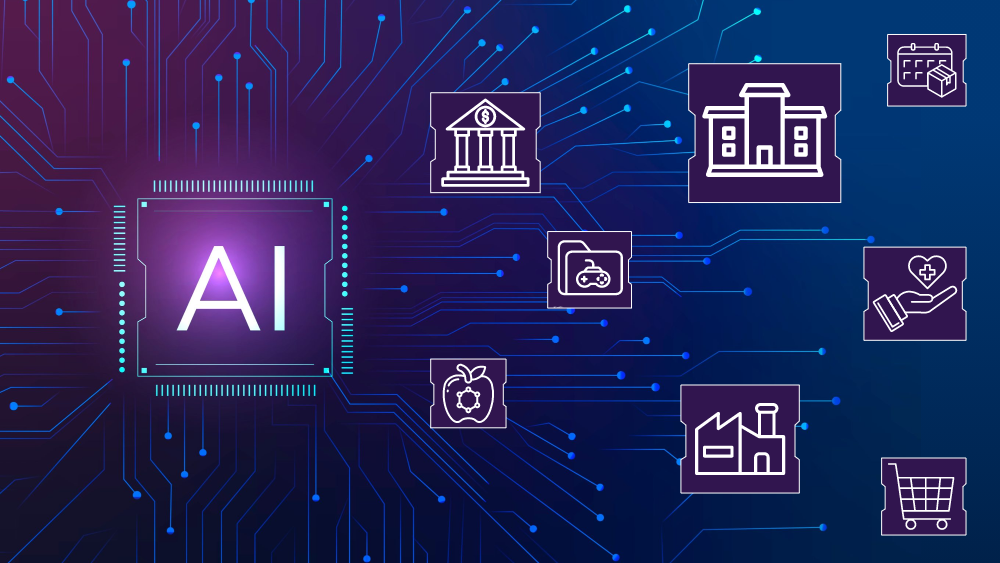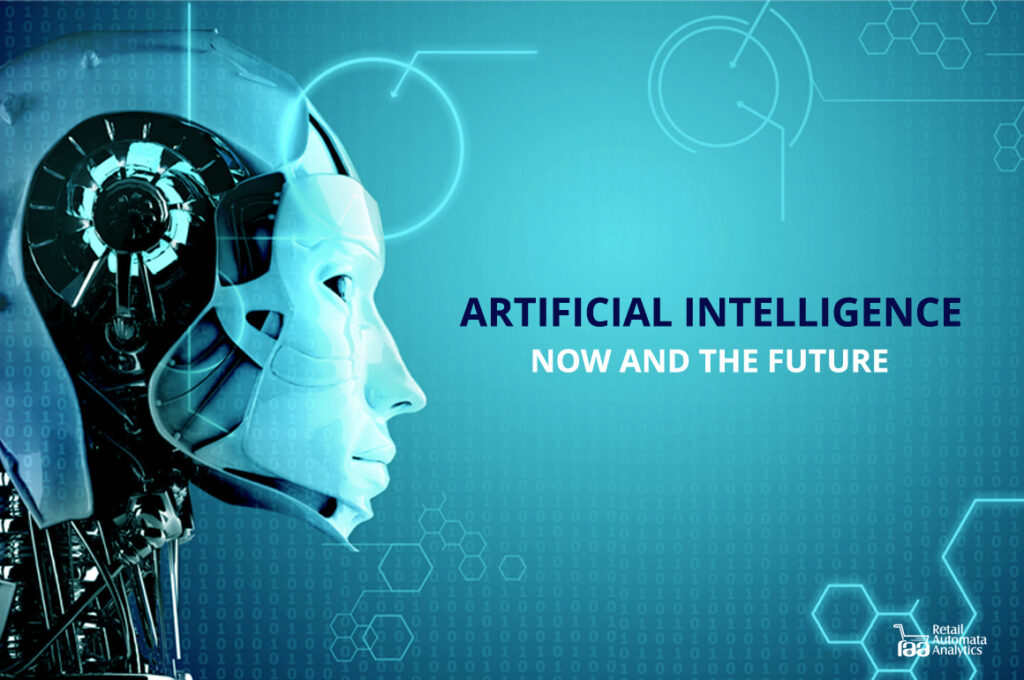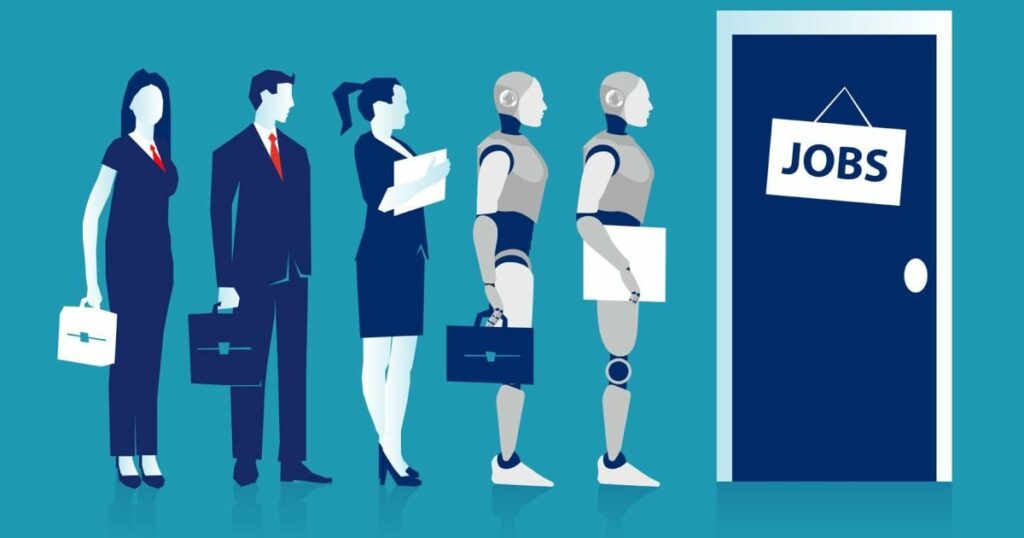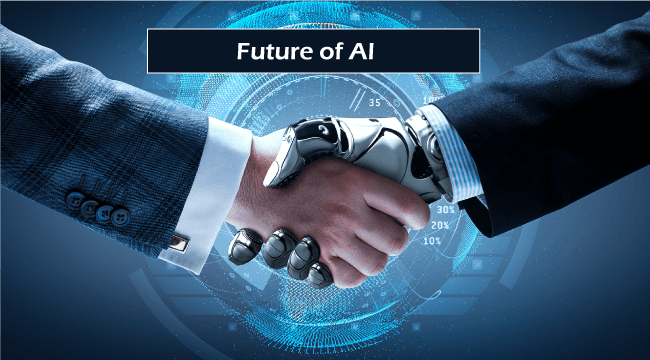Artificial Intelligence (AI), an ever-evolving field, continues to redefine the boundaries of what machines can accomplish. It’s a multidimensional discipline, comprising Machine Learning, Natural Language Processing, and Robotics, each with its unique subsets and applications. As we step into 2023, we find ourselves amidst an AI revolution that’s transforming industries, altering job roles, and shaping societal norms. AI’s potential to imitate human cognition, learn from experiences, make decisions, and solve complex problems makes it a powerful tool.
However, this technology doesn’t come without its challenges, particularly in areas of ethics and data privacy. This blog delves into the The Future of Artificial Intelligence (AI), exploring its growth, its future implications, and the measures needed to ensure its responsible and beneficial use for humanity.

History of AI
Artificial Intelligence (AI), a concept now deeply ingrained in our lives, traces its roots back to the mid-20th century. The term ‘Artificial Intelligence’ was first coined at the Dartmouth Conference in 1956, marking the history of AI as an independent field. Initially focusing on problem-solving and symbolic methods, AI has seen several “winters” and “springs”, characterized by cycles of progress and disillusionment. The game-changer came in the form of Machine Learning, a subfield of AI, which employs statistical techniques for empowering machines to ‘learn’ from data. The advent of deep learning, a further subset of machine learning, has been instrumental in driving the recent AI boom. As we move into 2023, AI continues to evolve, broadening its impact and transforming the world around us.
Key Components of AI
Artificial Intelligence (AI) is a multifaceted domain, encompassing various key components that power its ability to mimic human intelligence. These critical components include:
1. Machine Learning (ML):
The bedrock of AI, Machine Learning equips computers with the ability to ‘learn’ from data, thereby improving their performance over time without being explicitly programmed. It includes various techniques such as:
. Supervised Learning: Here, models are trained on labeled data, learning to predict outcomes based on input features.
. Unsupervised Learning: In this approach, models find hidden patterns or intrinsic structures in unlabeled data.
. Reinforcement Learning: This technique involves an agent that learns to make decisions by performing actions and receiving rewards or penalties.
2. Deep Learning (DL):
A subset of ML, Deep Learning employs artificial neural networks, particularly deep networks with multiple layers, to learn complex patterns from large amounts of data. It has revolutionized fields such as:
. Image Recognition: Deep Learning algorithms are exceptional at recognizing and categorizing images.
. Speech Recognition: These algorithms are behind voice-activated assistants like Siri and Alexa.
3. Natural Language Processing (NLP):
This component enables machines to understand, interpret, generate, and respond in human language, significantly enhancing human-computer interactions. NLP powers:
. Translation Services: Services like Google Translate use NLP for real-time language translation.
. Sentiment Analysis: NLP helps in understanding customer sentiment from product reviews or social media posts.
4. Robotics:
While often considered a separate field, Robotics intersects with AI when creating autonomous robots. Through AI, robots can navigate environments, recognize objects, and perform complex tasks. Robotics powers:
. Autonomous Vehicles: Self-driving cars use AI to perceive their environment and make driving decisions.
. Manufacturing Robots: Robots on assembly lines can perform repetitive tasks more efficiently and safely than humans.
As these components of AI continue to evolve and converge, we’re witnessing an unprecedented impact on various sectors, from healthcare and education to transportation and entertainment.
AI Applications in Everyday Life
Artificial Intelligence (AI) has transitioned from being a buzzword in science fiction to becoming an integral part of our daily lives. The following are key areas where AI is currently being applied:
1. Personal Assistants: Siri, Alexa, and Google Assistant use AI’s Natural Language Processing (NLP) capabilities to understand and respond to voice commands, making everyday tasks more accessible and convenient.
2. Navigation and Transportation: AI powers GPS systems that provide optimal routes based on traffic data. It’s also the driving force behind autonomous vehicles that can operate without a human driver.
3. Online Shopping: AI algorithms suggest products based on browsing and purchasing history, enhancing the shopping experience. AI also helps manage inventory and predict customer trends.
4. Social Media: AI in social media platforms like Facebook and Instagram filters content, identifies fake news, and even recognizes faces in images.
5. Healthcare: AI is used in predictive analytics for disease outbreaks, personalized medicine, and robotic surgeries. It’s also used in developing virtual nursing assistants.
6. Entertainment: Netflix, Spotify, and YouTube use AI to recommend movies, songs, and videos based on users’ past behavior.
7. Finance: AI assists in fraud detection, managing investments, and providing personalized financial advice. It also powers chatbots in customer service.
8. Home Automation: AI powers smart homes, with devices like thermostats, lights, and security systems that can adapt to our behaviors and preferences.
9. Education: AI enables personalized learning, where curriculum and learning experiences are tailored to individual students’ needs and abilities.
10. Job Recruitment: AI tools screen resumes and shortlist candidates, saving time and reducing bias in hiring processes.
AI’s potential is immense and still largely untapped. As we look towards the future, it is clear that AI will continue to permeate more areas of our lives, transforming the way we work, learn, and interact.

Transforming Industries: AI in Healthcare, Finance, and Retail
Artificial Intelligence (AI) is revolutionizing multiple industries, driving unprecedented transformations in the way we diagnose diseases, manage finances, and shop. Here’s a look at how AI is changing the face of healthcare, finance, and retail sectors:
1. Healthcare:
. Diagnostic Tools: AI-powered tools are helping to detect diseases like cancer and Alzheimer’s in their early stages, increasing the chances of effective treatment.
. Personalized Medicine: AI is enabling precision medicine by predicting how different individuals will respond to specific treatments based on their genetic makeup and health history.
. Robotic Surgeries: Robots guided by AI are assisting in surgeries, offering greater precision and minimizing human error.
. Virtual Health Assistants: AI bots provide health advice, remind patients about medication, and monitor patients’ conditions to alert healthcare professionals if needed.
2. Finance:
. Fraud Detection: AI algorithms are instrumental in identifying unusual activities and transactions, helping to mitigate financial fraud.
. Robo-Advisors: AI-driven robo-advisors provide personalized financial advice and portfolio management, making wealth management more accessible.
. Algorithmic Trading: AI is used in predicting stock market trends and automating trading processes, enhancing investment strategies.
. Customer Service: AI-powered chatbots provide instant customer support, improving service efficiency and customer satisfaction.
3. Retail:
. Personalized Experience: AI helps retailers offer personalized shopping experiences by recommending products based on customers’ browsing and purchasing history.
. Inventory Management: AI systems predict demand and manage inventory, reducing overstock and understock scenarios.
. Virtual Try-Ons: AI-powered tools allow customers to virtually try on clothes, makeup, or furniture in their homes, improving the online shopping experience.
. Customer Insights: AI algorithms analyze customer data to reveal purchasing patterns and trends, enabling retailers to make data-driven decisions.
Ethical Considerations in AI Development

Artificial Intelligence (AI) continues to evolve and influence diverse aspects of our lives, it’s crucial to address the ethical considerations that emerge in its development and application. Here are key points to consider:
1. Transparency: AI systems should be transparent, and decisions made by them should be explainable to users. Understanding how AI makes decisions helps build trust and allows for accountability.
2. Privacy: AI’s ability to collect, analyze, and use vast amounts of data can invade privacy. Strict data governance measures need to be in place to protect users’ privacy.
3. Bias: AI systems can unintentionally perpetuate bias if trained on biased data. It’s essential to ensure diversity in data and to regularly test AI systems for fairness.
4. Job Displacement: Automation could lead to job displacement. Societies should prepare for this shift, offering training and support for affected individuals.
5. Security: As AI systems become integral to critical infrastructure, ensuring their security becomes paramount to prevent malicious use.
6. Regulation: Adequate laws and regulations should be established to guide AI development and use, balancing innovation with ethical and societal considerations.
7. Inclusion: AI should be developed and used in ways that are inclusive, accessible and benefit all segments of society, not just a privileged few.
Addressing these ethical issues is a collective responsibility involving AI developers, users, regulators, and society at large. Ethics should be integrated into the AI development process to ensure AI serves humanity in a beneficial and responsible way.
The Future of AI: Emerging Trends and Predictions
Fourth Industrial Revolution, Artificial Intelligence (AI) is not just a futuristic concept anymore. It’s here, transforming the way we live, work, and interact. Here are some key trends and predictions about the future of AI:
1. Hyper-Automation: AI, coupled with other technologies like Machine Learning (ML), Internet of Things (IoT), and Robotic Process Automation (RPA), will drive hyper-automation, automating more complex tasks and business processes.
2. Explainable AI (XAI): As AI algorithms become more complex, there’s a growing demand for transparency and interpretability. XAI will become critical in making AI decisions understandable and trustworthy.
3. AI in Cybersecurity: AI will play a crucial role in cybersecurity, identifying threats and responding to them faster than humans could, thereby enhancing system security.
4. AI-Driven Healthcare: From drug discovery to personalized medicine, AI will continue revolutionizing healthcare. AI algorithms might even outperform humans in diagnosing certain conditions.
5. Quantum Computing: Quantum computing could supercharge AI’s capabilities, solving complex problems that current computers can’t handle. This could accelerate advancements in areas like climate modeling and cryptography.
6. Ethics and Regulation in AI: As AI becomes pervasive, we’ll see increased focus on ethical guidelines and regulation. Privacy concerns, algorithmic bias, job displacement due to automation, and AI’s misuse are critical issues that need addressing.
7. Edge AI: With the growth of IoT devices, more AI processing will happen on the edge (on local devices) rather than in the cloud. This will reduce latency, save bandwidth, and enhance privacy.
8. Human-AI Collaboration: Rather than replacing humans, AI will increasingly work alongside us, augmenting our capabilities. The human-AI collaboration will become an essential part of businesses and everyday life.
9. Emotion AI: AI systems are being developed to understand and respond to human emotions. This could transform sectors like marketing, healthcare, and customer service.
10. AI for Social Good: AI has potential far beyond commercial applications. We’ll see more AI initiatives addressing social and environmental challenges, like predicting natural disasters, tackling climate change, or improving accessibility for people with disabilities.
AI’s future is both exciting and challenging. It holds enormous potential to drive progress, but it also calls for careful oversight to ensure its benefits are realized equitably and responsibly.
Related: Top 10 Breakthrough technologies in 2023.
AI and Job Market: Opportunities and Challenges

The advancements in Artificial Intelligence (AI) are revolutionizing the job market in many ways. Here are some of the significant opportunities and challenges associated with AI:
Opportunities:
1. New Job Creation: As AI evolves, new industries and roles that didn’t exist before are emerging. For example, roles related to AI ethics, AI data management, and AI security.
2. Automation of Mundane Tasks: AI can automate repetitive and mundane tasks, freeing up time for employees to focus on more creative, strategic, and fulfilling tasks.
3. Improved Decision Making: AI can analyze vast amounts of data to provide valuable insights, assisting in better decision-making and strategy development.
4. Increased Productivity: AI-driven automation can enhance productivity and efficiency in various sectors, including healthcare, finance, and manufacturing.
Challenges:
1. Job Displacement: While AI creates new jobs, it may also make certain roles redundant, leading to job displacement. This is particularly relevant for roles involving repetitive tasks.
2. Skill Gap: As the demand for AI-literate professionals grows, there is a widening skill gap in the job market. Effective retraining and education programs are needed to upskill the workforce.
3. Ethical Considerations: With AI taking over certain jobs, ethical considerations like employee privacy and algorithmic bias become critical.
4. Inequality: AI could potentially widen income inequality if its benefits primarily go to those with the skills to use it or the capital to invest in it.
The impact of AI on the job market underscores the importance of adaptability, lifelong learning, and policy-making to ensure a smooth transition into this new era.
Conclusion
The future of Artificial Intelligence (AI) holds immense promise. The technology is evolving at an unprecedented pace, offering transformative potential across all sectors, from healthcare to education, and from finance to transportation. However, with great power comes great responsibility. We must actively foster continuous learning and skill development to stay relevant in this AI-driven world. Ethical considerations and robust regulations are crucial to guide AI’s beneficial use. Importantly, the goal should be a future where AI doesn’t replace humans, but where humans and AI work together to bring about an inclusive, prosperous future.


